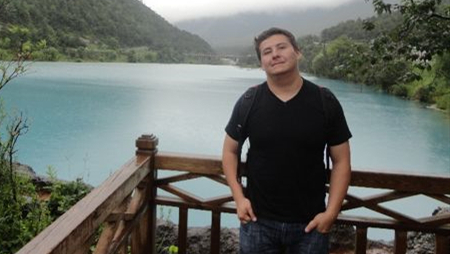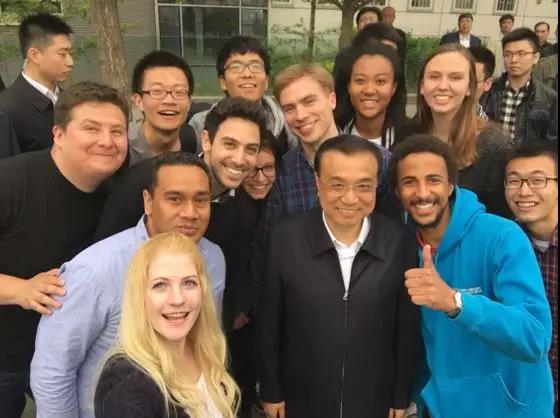[PKU excellent int’l alumni] Peter Mauricio: Beida pushes me to be good
Aug 16, 2019
Peking University, Aug. 16, 2019: As a Bolivian student from South America, Peter Mauricio Larrea Parra pursued his doctoral degree in environmental economics and policies at Peking University from 2011 to 2019. During his time at PKU, he translated several Chinese books and articles into Spanish as an expert in China and Latin America’s environmental and economic issues, and worked as a teaching assistant in the course of Towards a Sustainable Future: China's environmental challenges. In 2014, he was granted with Peking University Student Excellence Scholarship.
 Peter Mauricio Larrea Parra
Peter Mauricio Larrea Parra
In 2009, Peter Mauricio Larrea Parra, then professor in Bolivian Private University (BPU), decided to pursue a Ph.D. degree. He was teaching at BPU back then but realized the need of self-improvement for an ideal life. At first, Mauricio planned to go to a European country or the United States for further education but he changed his mind after reading a notice from Chinese Embassy about Ph.D. programs for Bolivians and an enjoyable conversation with a like-minded Chinese ambassador.
At the time, China was hosting the 2008 Olympic Games and was under rapid economic development. Chinese government provided Bolivian students with preferential policy. Going to China and fulfilling one’s academic pursuit at one of China’s most prominent universities was a guarantee for a brighter future.
Fresh touch of life in Beijing
When Mauricio came to China in 2009, he knew nothing about Chinese language. Having difficulty communicating with locals in English at the same time, Mauricio spent five hours on the way from West Gate to Shaoyuan Garden, a distance no more than 200 meters. In order to master Chinese and better understand courses taught in Chinese, he spent two years learning Chinese language before he actually started his research life as a Ph.D. student. Luckily, on his first day of arrival, Mauricio got to know a Chilean friend who had already commanded Chinese language well and had been familiar with life around campus.
This friend helped him adapt to the life in Beijing. He took Mauricio to Carrefour (a supermarket close to Beida) so that the fresh-off-the-boat could have a taste of what Chinese lifestyle was like. Mauricio’s first purchase at a Chinese grocery store was pidan (preserved eggs). “It was a terrible feeling!” Mauricio said, “It’s hard to imagine how anyone would enjoy eating such a thing.” But except for a few Chinese food like pidan and stemmed buns, Mauricio finds Chinese dishes palatable.
Thanks to this Chilean friend, Mauricio got his lyrical Chinese name--马德仁(Ma Deren), a name so Chinese that he got extra attention from Chinese professors and classmates who thought him a Chinese student.
 PKU landmark Boya pagoda and Mauricio
PKU landmark Boya pagoda and Mauricio
Culture Shock at PKU
Like most international students, Chinese students’ diligence impressed Mauricio a lot. “For South Americans, weekends are supposed to be the leisure time. It’s important for us to really enjoy our life”, he said, adding that Chinese students, in contrast, tend to put the study and work as a priority over anything else.”
On Mauricio’s first day at the office, he was greeted by his peers with only “We are busying studying. Please talk to us later” after enthusiastically introducing himself and attempting to make friends with other fellow Ph.D. students. When he invited his Chinese friends to hang out with him during weekend, nine out of ten times the answer would be “to study”.
Mauricio fell behind his Chinese peers academically in the first year of his Ph.D. program but it didn’t make him lose faith. He made up his mind that by the time he got his doctoral degree, he would achieve academic success as great as any of those hardworking Chinese peers. He tried to keep a balance between study and life, learning to study like a Chinese student the moment he steps into the classroom.
Finally, Mauricio graduated from PKU with outstanding academic achievements. He indeed lived up to his expectations of himself.
 Mauricio, his supervisor and schoolmates
Mauricio, his supervisor and schoolmates
Impressive experiences at PKU
“My supervisor is extremely amazing, I would say”, when talking about the teachers and staff at PKU, Mauricio said he couldn’t be more grateful to them, “In the hardest times of my life, my supervisor has always been there for me.”
In 2014, Mauricio had difficulty paying off the operation fee after a major knee surgery. Upon learning this, Mauricio’s supervisor paid the fee in advance and told him not to worry about money but to relax and take good rest.
“I was lucky to be here, to be able to meet amazing people,” Mauricio said. PKU provides students with a huge platform and many chances of unique experiences. In his ten years at PKU, Mauricio even met with Chinese Prime Minister Li Keqiang as well as world-renowned movie actor Jackie Chan.
 Chinese Premier Li Keqiang and Mauricio
Chinese Premier Li Keqiang and Mauricio
Ten years, no regrets
When writing his Ph.D. thesis, Mauricio went to bed at around 2 a.m. every night and woke up at 5 in the morning. “If you want to be good at Beida, you have to make extra efforts. If you just want to be average you’ll just be average. Each person is responsible for the results he gets here, but Beida is pushing you to be good.” The atmosphere created by peer pressure at PKU is pushing students here to work harder for better results.
Students here at PKU are outstanding. Therefore, it is important to find one’s own niche, which is why Mauricio took advantage of his identity as a Latin American, majored in environmental economics and policies and translated books concerning China and Latin America’s environmental and economic issues.
Now, Mauricio is planning to continue his postdoctoral research at Beijing Normal University (Zhuhai) after a short visit back home. He said he would definitely recommend Peking University to Bolivian students who love challenges as he does and is as perseverant as he is. “I learned so many things here with Chinese as a carrier. If I didn’t come to Beida, that part of my life would be empty. Here at Beida, I was surrounded with doors open and each of them leads to a beautiful new world”, he said.
Reported by: Qiu Kanghua
Edited by: Zhang Jiang



